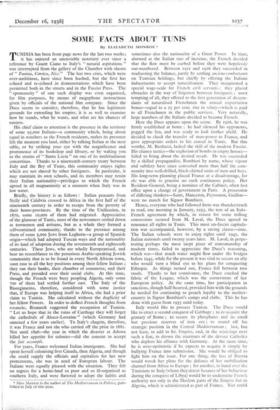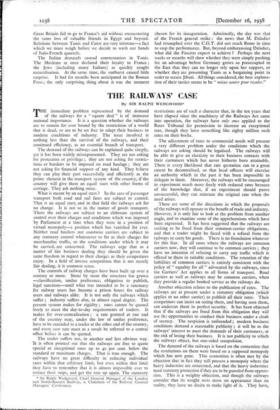SOME FACTS ABOUT TUNIS
By ELIZABETH MONROE *
His chief claim to attention is the presence in the territory of some 95,000 Italians—a community which, being about equal in numbers to the French residents, makes its presence felt the moment you land, either by talking Italian at the next table, or by striking your eye with the magnificence and prominence of its bookshop and library, or by waking you to the strains of" Santa Lucia" on one of its multitudinous concertinas. Thanks to a nineteenth-century treaty between Italy and the Bey of Tunis, this community enjoys rights which are not shared by other foreigners. In particular, it may maintain its own schools, and its members may retain their Italian nationality—privileges to which the French agreed in all magnanimity at a moment when Italy was in low water.
Briefly, the history is as follows : Italian peasants from Sicily and Calabria crossed to Africa in the first half of the nineteenth century in order to escape from the poverty of their home-provinces. By the time of the Unification, in 1870, some ro,000 of them had migrated. Appreciative. of the glamour of Tunis, most of the newcomers settled down as townsmen and artisans, but as a whole they formed a self-contained community, thanks to the presence among them of some 3,000 Jews from Leghorn—a group of Spanish origin—which had adopted Tuscan ways and the nationality of its land of adoption during the seventeenth and eighteenth centuries. These Jews, who are wholly Europeanised, and bear no resemblance to the penurious Arabic-speaking Jewish community that is to be found in every North African town, soon rose to all the key positions among their fellow Italians ; they ran their banks, their chamber of commerce, and their Press, and presided over their social clubs. At this time, though the French were busy peopling Algeria, only some 700 of them had settled further east. The Italy of the Risorgimento, therefore, considered with some justice that, if Europe was helping itself to Africa, she had a prior claim to Tunisia. She calculated without the duplicity of her fellow Powers. In order to deflect French thoughts from revanche, Bismarck suggested the occupation of Tunisia. "Let us hope that in the ruins of Carthage they will forget the cathedrals of Alsace-Lorraine" (which Germany had annexed a few years earlier). To Italy's chagrin, therefore, it was France and not she who carried off the prize in x881. Not until 1896—the year in which the disaster at Adowa killed her appetite for colonies—did she consent to accept the fait accompli.
For years, France welcomed Italian immigrants. She had spent herself colonising first Canada, then Algeria, and though she could supply the officials and capitalists for her new protectorate, she was in need of European labour. The Italians were equally pleased with the situation. They felt no regrets for a home-land so poor and so ill-organised as southern Italy, and were flattered to adopt the habits and * Miss Monroe is the author of The Mediterranean in Politics, pub- lished in July of this year. sometimes also the nationality of a Great Power. In time, alarmed at the Italian rate of increase, the French decided that the flow must be curbed before they were hopelessly out-numbered. Between 192/ and 1926 they succeeded in readjusting the balance, partly by settling anciens-combattants on Tunisian holdings, but chiefly by offering the Italians inducements to accept naturalisation. They inaugurated a special wage-scale for French civil servants ; they placed obstacles in the way of litigation between foreigners ; most tempting of all, they offered to the first generation of descen- dants of naturalised Frenchmen the annual expatriation bonus—equal to a 25 per cent. rise in salary—which is paid to all Frenchmen in the public services. Very naturally, large numbers of the Italians decided to become French.
Here the Duce appears upon the scene. By 1926, he was firmly established at home ; he had silenced his opponents, pegged the lira, and was ready to look farther afield. He decided to check the transfer of man-power to France, and gave appropriate orders to his consul in Tunis. But this worthy, M. Barduzzi, lacked the skill of the modern Fascist. His clumsy tactics—the explosion of bombs in empty houses— failed to bring about the desired result. He was succeeded by a skilled propagandist, Bombieri by name, whose vigour and subtlety have since converted more than half the com- munity into well-drilled, black-shirted units of men and boys. His long-term planning placed France at a disadvantage, for she was able to practise no such continuous policy. Her Resident-General, being a nominee of the Cabinet, often lost office upon a change of government in Paris. A procession of differing thinkers—Saint, Manceron, Peyrouton, Guillon- were no match for Signor Bombieri.
Hence, everyone who had followed form was thunderstruck to read, one morning in January, 1935, the text of an halo- French agreement by which, in return for some trifling concessions secured from M. Laval, the Duce agreed to renounce all rights in Tunis. This most un-fascist capitula- tion was accompanied, however, by a saving clause—time. The Italian schools were to enjoy rights until 1945, the Italian nationals until twenty years later. M. Laval, in perpe- trating perhaps the most inept piece of statesmanship of modern times, failed to appreciate the Duce's reasoning, which was—that much water might flow under the bridges before 1945, while for the present it was vital to secure an ally who would turn a blind eye to his plans for conquering Ethiopia. As things turned out, France fell between two stools. Thanks to her connivance, the Duce cracked the fabric of the League, which was the cornerstone of her European policy. At the same time, her participation in sanctions, though half-hearted, provided him with the grounds he needed for continuing to preach loyalty to the mother- country in Signor Bombieri's camps and clubs. This he has done with gusto from 1935 until today.
Italy would like to possess Tunisia. The Duce would like to enact a second conquest of Carthage ; to re-acquire the granary of Rome ; to secure its phosphates and its small but precious reserves of iron ore ; to round off his strategic position in the Central Mediterranean ; last, but not least, to add to his Empire, and, in the rejoicings over such a feat, to drown the murmurs of the devout Catholics who deplore his alliance with Germany. At the same time, he is over-optimistic if he expects to acquire it simply by bullying France into submission. She would be obliged to fight him on the issue. For one thing, the loss of Bizerta would wreck her plans for the defence of her mobilisation channel from Africa to Europe ; for another, to hand over the Tunisians to Italy (whom they detest because of her behaviour during the conquest of Libya) would be to undermine French authority not only in the Moslem parts of the Empire but in Algeria, which is administered as part of France. Nor could Great Britain fail to go to France's aid without encountering the same loss of valuable friends in Egypt and beyond. Relations between Tunis and Cairo are very intimate—a fact which we must weigh before we decide to wash our hands of Italo-French quarrels.
The Italian demands caused consternation in Tunis. The Moslems at once declared their loyalty to France ; the Jews (including many Italians) as quickly sought naturalisation. At the same time, the outburst caused little surprise. It had for months been anticipated in the Roman Press ; the only surprising thing about it was the moment chosen for its inauguration. Admittedly, the day was that of the French general strike ; the news that M. Daladier had triumphed over the C.G.T. did not reach Rome in time to stop the performance. But, beyond embarrassing Daladier, what did the Fascists expect to achieve ? Perhaps the next weeks or months will show whether they were simply pushing for an advantage before Germany grows so preoccupied in the East that they can no longer rely upon her support, or whether they are presenting Tunis as a bargaining point in order to secure Jibuti. All things considered, the best explana- tion of their tactics seems to be " mieux sauter pour rcculer."















































 Previous page
Previous page